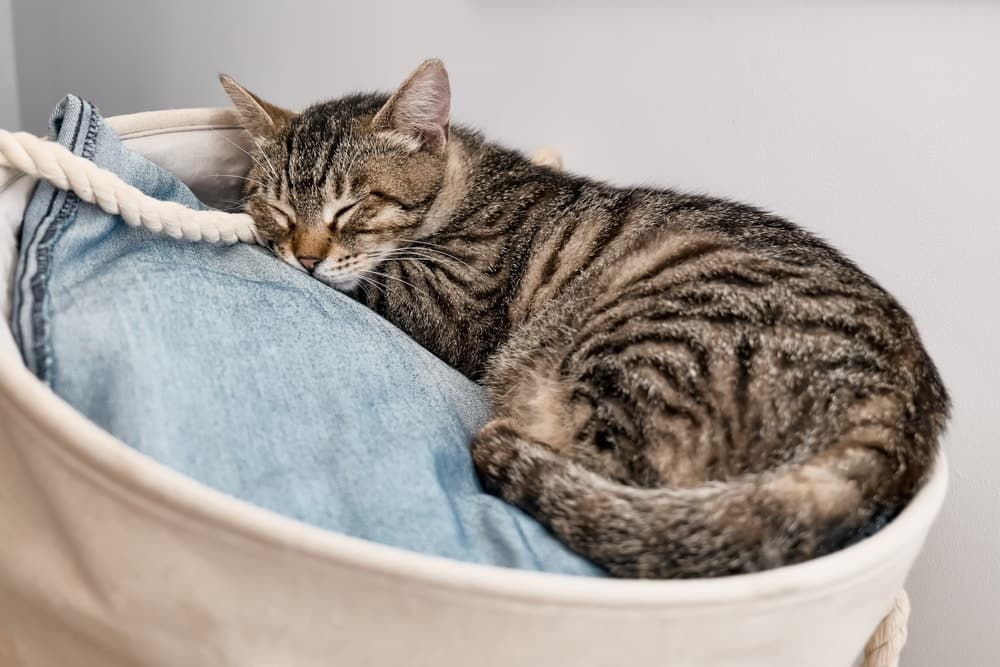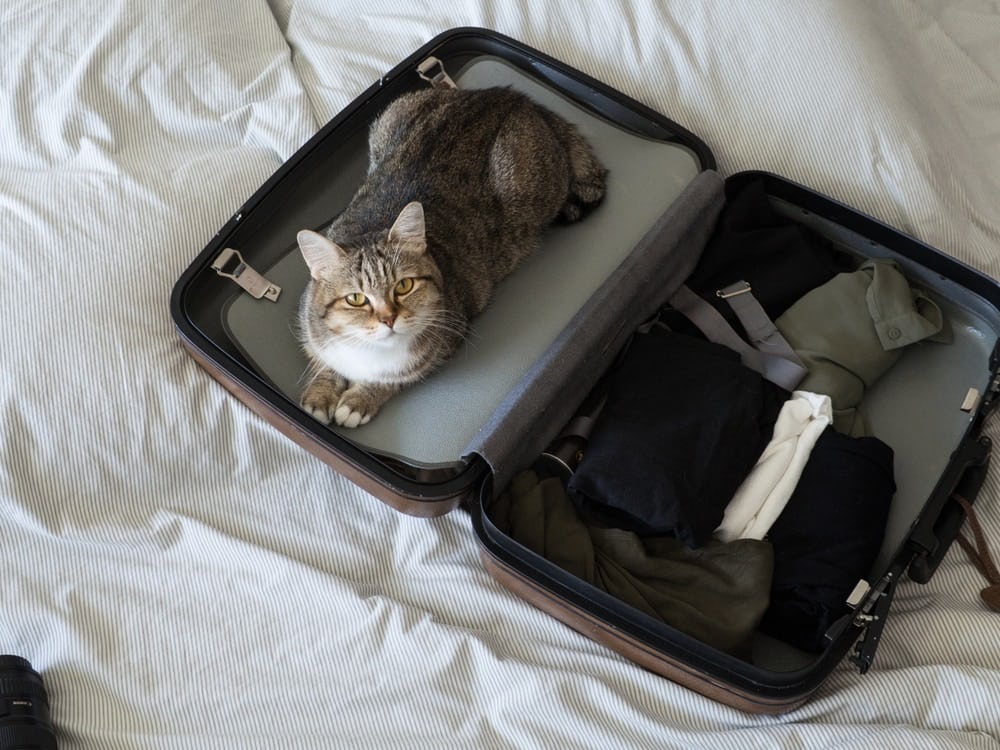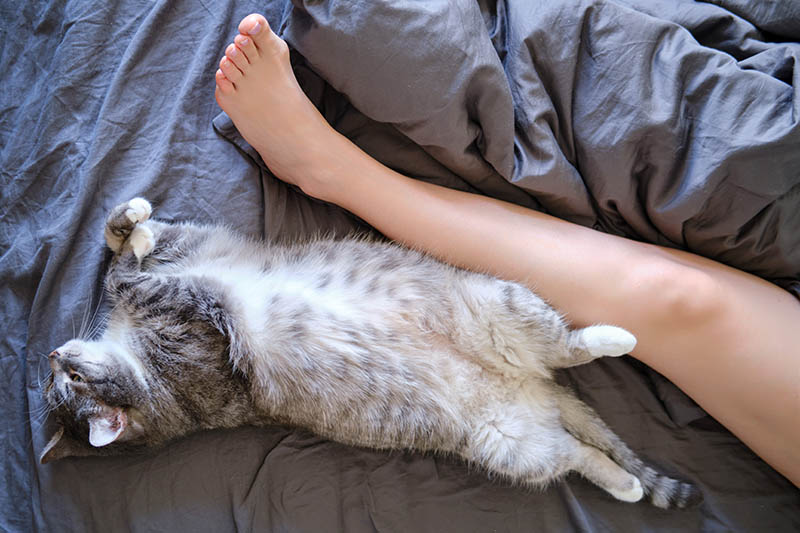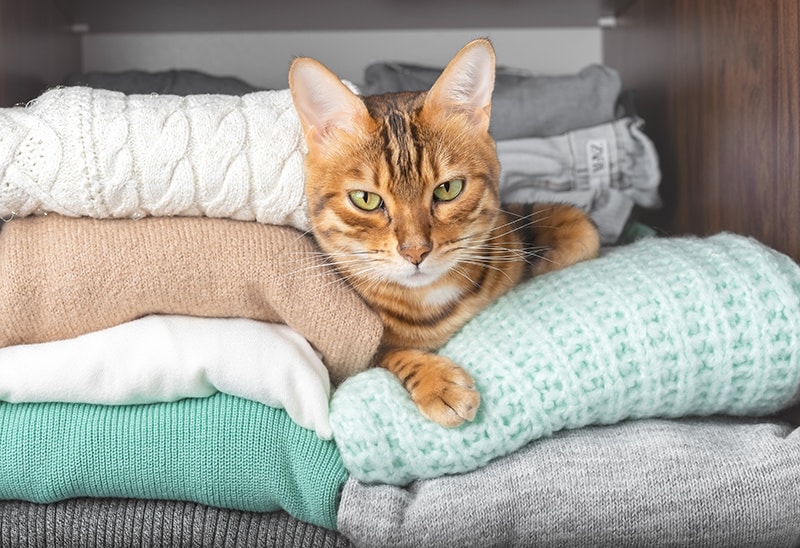For some reason, cats can’t seem to resist clean laundry. Most relish burrowing into warm laundry fresh from the dryer, and many refuse to move once comfortably snuggled deep in a laundry basket full of toasty sheets or clothes. But why do cats love clean laundry so much? Are they drawn to that wonderful laundry fresh smell many humans love, or is there something else that attracts cats to clean clothes just out of the drier? Read on to learn more about four reasons why cats like clean laundry.
The 4 Reasons Why Cats Like Clean Laundry
1. Freshly Dried Laundry Is Warm
Cats are often drawn to warmth. It’s one of the reasons many love afternoon naps in the sun and snoozing in front of warm spots like heaters and radiators. Cats have relatively high body temperatures; anything between 101 and 102.5°F is considered normal.
While cats are comfortable in temperatures between 86 and 97ºF Fahrenheit, many jump at the chance to snuggle in warmer areas when the opportunity presents itself. Laundry fresh from the drier is often nice and toasty and is just the right temperature to tempt coziness-seeking cats.
2. Cats Like Baskets
Many cats enjoy snuggling up in enclosed spaces as it provides a sense of safety and security. Sleeping in boxes and baskets often gives cats a feeling of being protected, making it easy for them to let go and relax as they don’t have to worry about predators (or the family dog) sneaking up on them.
Warm laundry in a basket hits several high notes regarding feline preferences. Clothes and bedding fresh from the dryer provide warmth, and the basket is a cozy, safe place to hang out.

3. Cats Enjoy Playing With Their Humans
Cats often enjoy interacting with their humans, and sitting in the middle of your clean laundry gives them a perfect opportunity to spend time with their favorite person. Some cats sit in the laundry basket and make a game of allowing their humans access to the contents, batting at socks and shirts as they leave the basket to be ironed or folded.
Cats have great associative memories; they know it’s time for dinner, partly because they associate certain household activities with being fed. Your cat likely recognizes that folding laundry provides a fun opportunity to engage with you, which is reinforced when you play with your cat while folding clothes or putting the laundry away.
4. Even Clean Laundry Smells Like You
Cats have amazing noses. The feline sense of smell is around 14 times more acute than humans. Cats often love hanging out in laundry baskets, as these enclosed spaces are filled with the comforting smells of their favorite people.
Thanks to those super feline olfactory abilities, your cat may detect your scent on clothes and bedding even after they’ve been laundered. Cats may also be drawn to sit on clean laundry to reintroduce familiar smells that were washed away.

Why Do Cats Like Hanging Out in Particular Places?
Cats seem to have magical powers when finding ways to ensure their fur stays on your clothes, bedding, couch, and anywhere else of interest. And many love to “help out” when it’s time to pack or make the bed. Cats engage in these activities most likely for many of the same reasons they’re attracted to clean laundry!
Hampers and luggage provide cozy, comfortable environments for a bit of relaxation. Helping out while you’re packing or making the bed gives your cat a chance to have some fun while engaging with their favorite person.
1. Clothes Hampers

Cats are notorious for hanging out in dirty laundry baskets since they’re enclosed (which cats generally love) and smell like the family. They’re also soft and comfortable and often the first place humans look when their feline companion is nowhere to be found. Keep laundry baskets behind locked doors or place a weight on the lid to keep your cat from hiding in your dirty clothes.
2. Luggage

Many cats can’t resist suitcases. They’re safe, protected spaces that smell like you! Cats often mysteriously show up when their human opens a suitcase and lays it on the bed or luggage rack. Many cats jump in immediately, but others wait until the packing has begun, as human clothing provides a nice, soft cushiony surface to enjoy as they put a stop (often through napping) to unwanted activities such as packing since the activity usually leads to their favorite person’s absence.
Consider giving your pet a fun alternative napping place (like a box with a nice warm towel) where they can hang out and watch the action.
3. Beds

Changing bedding with a cat in the house can be a serious challenge. Many cats jump under the covers the minute they realize you’re trying to remove them. Some even go limp to prevent their owners’ attempts to speed things along by moving them from one side of the bed to another.
But the real action often emerges when it’s time to make the bed, as many cats love jumping and batting at sheets as they unfurl above them. “Making the bed” with your cat is an excellent human-feline bonding activity; it can even give your pet a bit of a workout!
Conclusion
Cats are drawn to clean laundry for several reasons, including warmth and comfort. Clothes and sheets fresh from the dryer are usually warm and perfect for snuggling up in, particularly since cats are typically drawn to heat.
Many cats enjoy hanging out or napping in enclosed spaces, such as baskets, as they feel protected and secure. While your laundry may be freshly washed, your cat’s sensitive nose can probably still pick up on your scent, making warm laundry cozy and comforting. Also, your cat may see laundry day as a wonderful time to hang out with you and provide “assistance.”
Featured Image Credit: Svetlana Rey, Shutterstock











